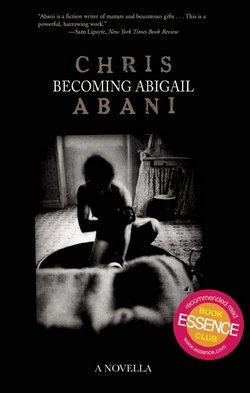Читать книгу Becoming Abigail - Chris Abani - Страница 1
На сайте Литреса книга снята с продажи.
ОглавлениеCritical Praise for GraceLand by Chris Abani
• Winner: 2005 Hemingway/PEN Prize
• Winner: 2005 Silver Medal, California Book Awards
• Winner: 2005 Hurston/Wright Legacy Award
• Finalist: 2005 Los Angeles Times Book Prize
• Shortlisted for the Best Book Category (Africa Region) of the Commonwealth Writer’s Prize
• 25 Best Books of 2004: Los Angeles Times
• Best Books of 2004: San Francsico Chronicle
• Barnes and Noble Discover Great New Writers Selection
• New York Times Book Review Summer 2004 “Vacation Reading/ Notable Books” Selection
“Extraordinary . . . This book works brilliantly in two ways. As a convincing and unpatronizing record of life in a poor Nigerian slum, and as a frighteningly honest insight into a world skewed by casual violence, it’s wonderful . . . And for all the horrors, there are sweet scenes in GraceLand too, and they’re a thousand times better for being entirely unsentimental . . . Lovely.”
—New York Times Book Review
“Chris Abani’s GraceLand is a richly detailed, poignant, and utterly fascinating look into another culture and how it is cross-pollinated by our own. It brings to mind the work of Ha Jin in its power and revelation of the new.”
—T. Coraghessan Boyle, author of Drop City
“Abani’s intensely visual style—and his sense of humor— convert the stuff of hopelessness into the stuff of hope.”
—San Francisco Chronicle
“GraceLand amply demonstrates that Abani has the energy, ambition, and compassion to create a novel that delineates and illuminates a complicated, dynamic, deeply fractured society.”
—Los Angeles Times
“A wonderfully vivid evocation of a youth coming of age in a country unmoored from its old virtues . . . As for the talented Chris Abani, his imaginary Elvis is as memorable as the original.”
—Chicago Tribune
“GraceLand teems with incident, from the seedy crime dens of Maroko to the family melodramas of the Oke clan. But throughout the novel’s action, Abani keeps the reader’s gaze fixed firmly on the detailed and contradictory cast of everyday Nigerian life. Energetic and moving . . . Abani [is] a fluid, closely observant writer.”
—Washington Post
“Abani has written an exhilarating novel, all the more astonishing for its hard-won grace and, yes, redemption.”
—Village Voice
“Ambitious . . . a kind of small miracle.”
—Atlanta Journal-Constitution
“It is to be hoped that Mr. Abani’s fine book finds its proper place in the world . . . [Abani’s] perception of the world is beyond or outside the common categories of contemporary fiction and he is able to describe what he perceives compellingly and effectively . . . [Abani captures] the awful, mysterious refusal of life’s discrete pieces to fit.”
—New York Sun
“An intensely vivid portrait of Nigeria that switches deftly between rural and urban life.”
—Boston Globe
“Singular . . . Abani has created a charming and complex character, at once pragmatic and philosophical about his lot in life . . . [and] observes the chaotic tapestry of life in postcolonial Africa with the unjudging eye of a naïve boy.”
—Philadelphia Inquirer
“Abani masterfully gives us a young man who is simultaneously brave, heartless, bright, foolish, lustful, and sadly resigned to fate. In short, a perfectly drawn adolescent . . . Abani’s ear for dialogue and eye for observation lend a lyrical air . . . In depicting how deeply external politics can affect internal thinking, GraceLand announces itself as a worthy heir to Chinua Achebe’s Things Fall Apart. Like that classic of Nigerian literature, it gives a multifaceted, human face to a culture struggling to find its own identity while living with somebody else’s.”
—Minneapolis Star-Tribune
“GraceLand is an invaluable document.”
—San Diego Union-Tribune
“Remarkable . . . Chris Abani’s striking new novel, GraceLand, wins the reader with its concept—an Elvis impersonator in Nigeria—and keeps him with strong storytelling and characterization . . . GraceLand marks the debut of a writer with something important to say.”
—New Orleans Times-Picayune
“GraceLand paints an often horrific and sometimes pro found portrait . . . Though a work of fiction, GraceLand also serves as a history far more powerful and fantastic than any official account of Nigeria’s teetering progress toward democracy.”
—Seattle Weekly
“The book’s juxtaposition between innocence and bleak survival is heartrending . . . Sharp, graphic, and impossible to dismiss.”
—Seattle Times
